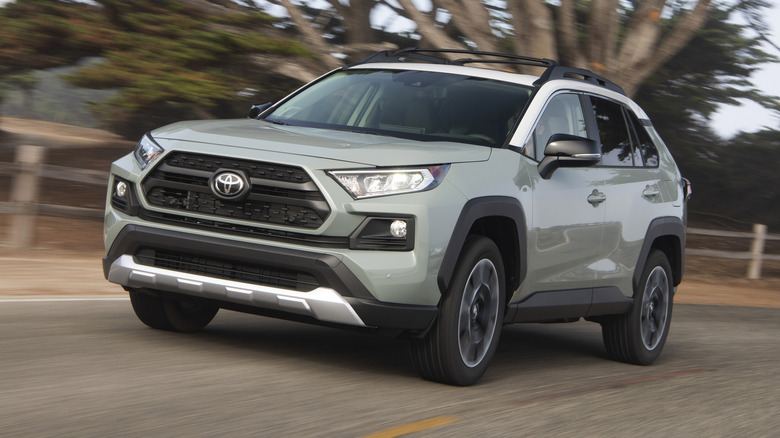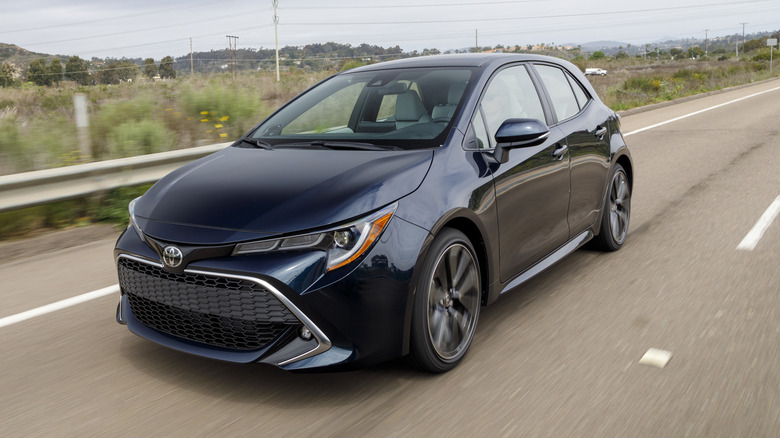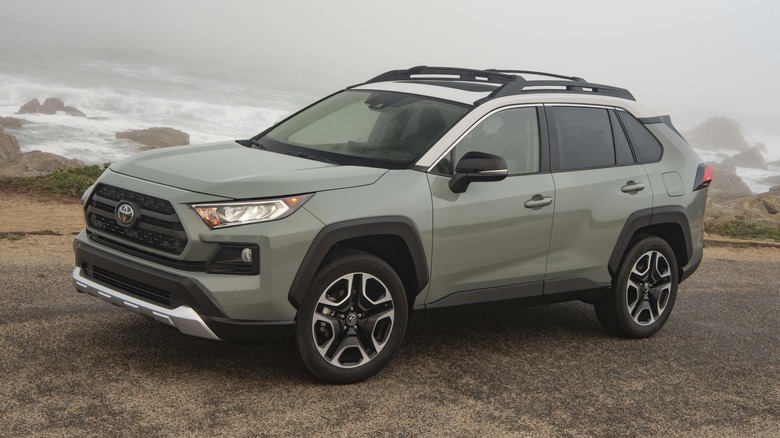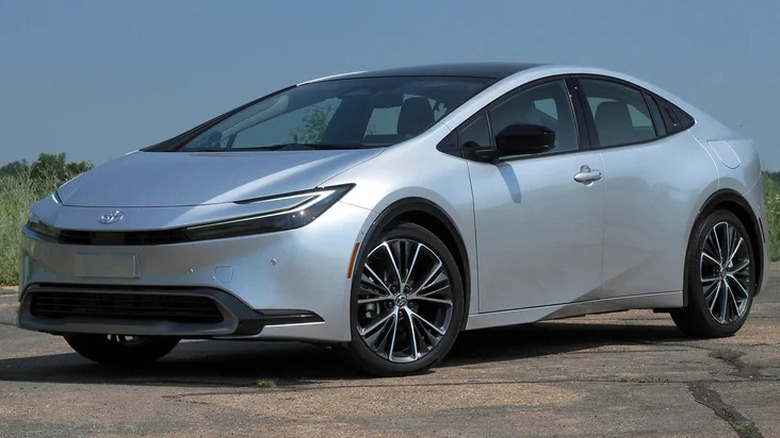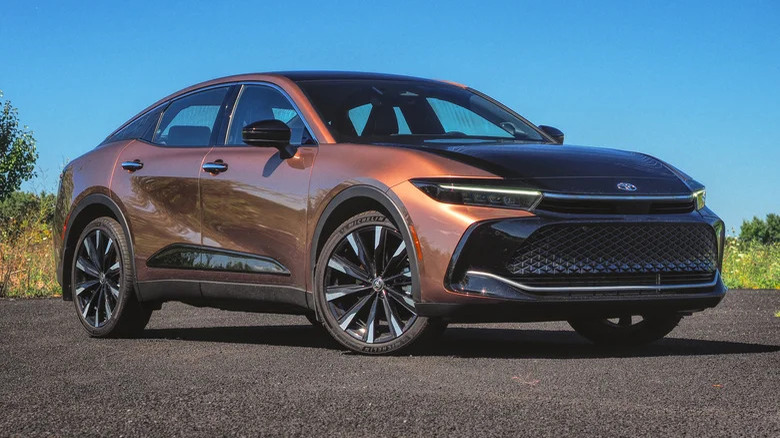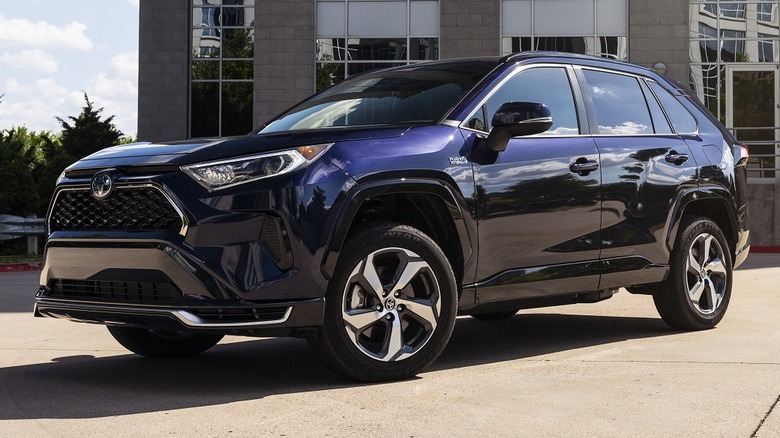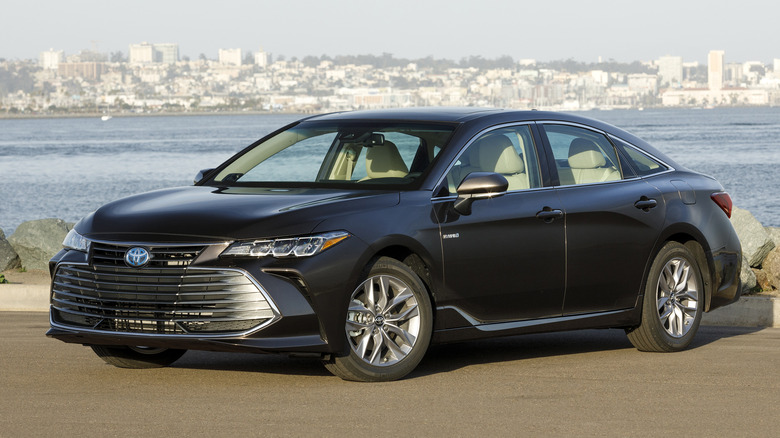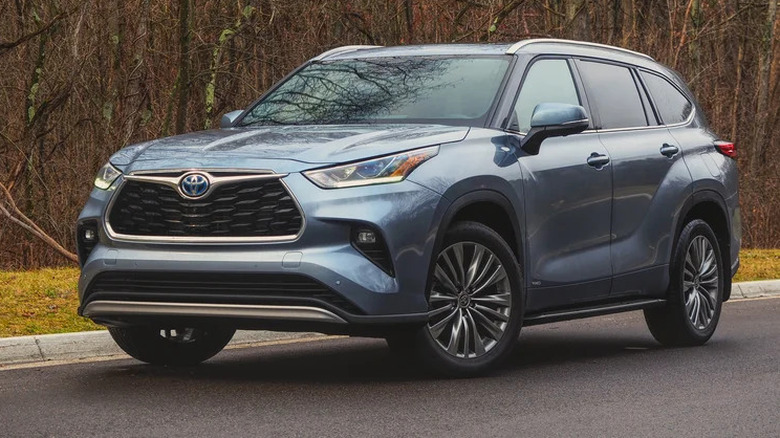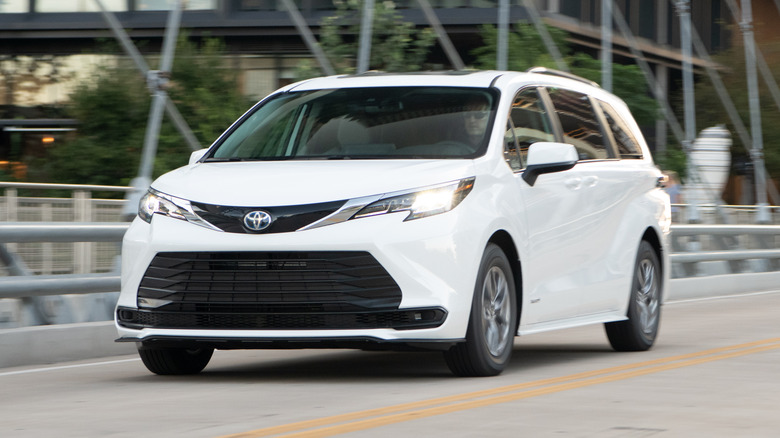8 Fuel-Efficient Toyota Models That Still Hold Up In 2024
Toyota remains the world's largest carmaker, selling 11.2 million vehicles across the world in 2023, per Reuters. Its continued success can be put down to the brand's knack of catering to both mass-market buyers and, increasingly in recent years, to enthusiasts too. Keeping everyone happy is no easy task, but no matter whether you're in the market for an economy hatchback or a plush three-row SUV, there's something in Toyota's lineup that will fit the bill.
Not only that, but the brand has a hard-earned reputation for consistently making some of the most fuel-sipping cars on the market. The Prius remains on sale as its original hybrid model, but offered alongside are a wide range of both hybrid and non-hybrid cars with competitive EPA ratings. It's been churning out cars like this for years, which means that buyers in the market for an economical, affordable car that still holds up today aren't restricted to buying new. We've rounded up a selection of eight top picks from previous model years, all of which are well worth considering in 2024.
2021 Toyota Corolla Hatchback
For anyone looking for a cheap, reliable, and practical car, it's difficult to go wrong with a Toyota Corolla. We also thought the latest generation model, which we tested in 2021, improved on the fun factor over the previous generation, even if it wasn't top of the class when it came to driver enjoyment. That honor instead went to the Mazda 3, but the Corolla Hatchback still boasted zippier handling and a more eager throttle response than previous Corolla generations.
The 168 horsepower on offer from the car's 2.0L four-cylinder engine is a respectable figure for the segment, while the six-speed manual should please those who want something more involving than a CVT. The latter transmission was also available as an optional extra for the 2021 model year. Both options are just as frugal, with official EPA ratings of 37 mpg highway, 28 mpg city, and 31 mpg combined. Our own testing showed the Corolla performed even better than those official figures, even with some occasional spirited driving thrown into our route.
2019 Toyota RAV4
The current generation RAV4 is a bestseller, and for good reason. It debuted for the 2019 model year, and in our initial review, we concluded the car was "one of the most comfortable compact SUVs for the price-conscious buyer on the market today." In particular, we were impressed with the car's interior, which featured upholstery that felt both suitably durable yet more premium than previous Toyota SUVs. The Multi-Terrain Select system on all-wheel-drive models was also a highlight, with new modes to help the car deal better with rougher terrain.
It's the front-wheel drive RAV4, however, that came out on top where fuel economy was concerned. According to the EPA, drivers could expect to see 34 mpg on the highway, 26 mpg in the city, and 29 mpg combined. We saw nothing during our testing that cast doubt on the accuracy of those figures. Across all trims, the RAV4 featured a 2.5L four-cylinder engine, with 203 horsepower on tap. That's plenty for everyday driving, although we thought a slight boost wouldn't have gone amiss. Still, the RAV4 delivers on all the key elements buyers will be looking for: It's practical, economical, and with Toyota's standard Safety Sense 2.0 package, a safe choice for transporting loved ones too.
2023 Toyota Prius
The Prius has long been one of Toyota's most polarizing cars. Earlier generations were praised by some for their frugal nature, but criticized by others for their awkward looks and lack of personality. While the all-new 2023 Prius isn't much more enjoyable to drive than its predecessor, it's certainly a lot better looking. It's sleeker, both from the outside and inside, but it doesn't compromise on the key qualities that made the original such a sales success in the first place.
It's still practical and roomy, with our reviewer noting that both front and rear headroom has been improved over previous generations. It's also similarly affordable, making it accessible to buyers who want a greener car but can't justify the added expense of a BEV. Most crucially, though, it's still very efficient. Our tester, a Prius in front-wheel drive Limited trim, is officially rated for a consistent 52 mpg across all types of driving, according to the EPA. Our own mpg results were slightly lower, with an average of 46 mpg, but that's still significantly more parsimonious than most other cars on the market.
2023 Toyota Crown
For efficiency-conscious buyers, the 2023 Toyota Crown is either a great option or a slight disappointment — it all depends on which trim you pick. The most frugal choice is the hybrid-assisted 2.5L four-cylinder engine available with the XLE and Limited trims. It's rated by the EPA for 41 mpg on the highway, 41 mpg in the city, and 41 mpg in combined driving. Its total output is more than adequate at 236 horsepower, but those looking for a bit more poke under the hood will want the 340-horsepower Hybrid MAX powertrain. However, the added power affects fuel economy significantly, with the car's EPA-quoted combined rating down to 30 mpg.
So, the only real option for buyers looking to save fuel is to sacrifice the extra power. Luckily, the Crown's top-tier standard safety tech, ergonomic interior, and noteworthy exterior styling remain unchanged across all trims. Its interior, it's worth noting, is less unique than some buyers might expect from the outside. It's a fairly bog-standard Toyota cabin, which would be no bad thing, were this not such an unusual-looking car in every other regard. Get past that, however, and the Crown makes a compelling alternative to the raft of generic crossovers on the market.
2021 Toyota RAV4 Prime
Buyers who prefer to blend in rather than stand out will want to look past the Crown and head straight for one of Toyota's other hybrid models, like the 2021 RAV4 Prime. Much like the gas-only RAV4, the Prime boasts rugged styling, lots of standard safety tech, and a thoughtfully designed cabin. The difference, however, is that the Prime's PHEV powertrain adds the ability to travel up to 42 miles on electric power only, while a 2.5L four-cylinder gas engine provides power for longer trips.
The RAV4's combined power output of 302 horsepower more than offsets the battery's added weight, although we thought its extra mass was more noticeable in the corners. What it lacks in driving dynamics, it makes up for in frugality, with an EPA rating of 94 mpg in hybrid mode, or 38 mpg without electrical assistance. As standard, the car comes with a Level 1 charger, which takes 12 hours to juice up after it's depleted. A faster option is to use a Level 2 charger — although with a charging time of 4.5 hours, it's still not what most people would consider speedy.
2019 Toyota Avalon Hybrid
The Avalon sedan is no longer available new — it's been effectively replaced in the lineup by the Crown — but it still makes a compelling used pick for buyers looking for a comfortable cruiser. Our review of the 2019 model year Avalon praised its revised styling, updated infotainment, and premium interior. Particularly in top-spec trim, the leather upholstery and wood trim made the Avalon's cabin a more inviting place to be than in previous generations, and the 1,200-watt optional audio system on our tester was another highlight.
While a 3.5L V6 option was available, by far the best option for buyers looking to keep gas station visits to a minimum is the Avalon Hybrid. It packs a 2.5L four-cylinder engine and makes a combined 215 horsepower, which is plenty given the car's relaxed driving dynamics. The EPA rates the Avalon Hybrid as achieving 43 mpg across the board — not quite Prius levels, but enough to put it ahead of other cars in its segment.
2023 Toyota Highlander Hybrid
The Toyota Highlander Hybrid is a family favorite SUV that doesn't spring any surprises upon buyers. That's no bad thing, though — it continues to be practical, roomy, and frugal, with the Highlander Hybrid AWD rated for 35 mpg in all three of the EPA's driving categories. That's significantly more fuel-efficient than most other three-row SUVs, although we thought the official figures might have been a bit optimistic. Our reviewer saw an average of 29 mpg across a route that included both highway and city driving.
In its most upscale trims, we thought there was more than a hint of Lexus in the Highlander Hybrid's interior, although lower-spec models don't get the same level of niceties. Safety Sense 2.5+ remains consistent across the whole range, however, including features like lane-keeping assist, pedestrian detection, and adaptive cruise control. The cabin is competitively sized too, with plenty of room for the first and second rows. The third row is slightly less impressive, but with the back seats folded down, cargo space is among the best in class.
2021 Toyota Sienna
Minivans might not be as popular as they once were, but for buyers not sold on the perks of SUV ownership, they offer an equally practical and spacious alternative. As the market demand for minivans has diminished, so has the range of models on offer. The Toyota Sienna is one of the few left on the market, having last seen a major refresh for the 2021 model year. The latest generation of the minivan features a hybrid powertrain as the sole option, with a 2.5L four-cylinder engine assisted by either one or two electric motors. The latter option is reserved for all-wheel drive models, which are good for a combined 245 horsepower.
The 2021 Sienna offers an overhauled exterior and fresh tech in the cabin, but its overall appeal remains much the same as the outgoing model. It's supremely practical, with plenty of storage space and even optional extras like a built-in refrigerator. Plus, it's just as efficient as buyers will expect it to be. According to EPA figures, the Sienna Hybrid achieves 36 mpg on the highway, 35 mpg in the city, and 35 mpg combined. Our test car delivered figures only a few mpg short, logging a combined 33 mpg over the course of our mixed route.
